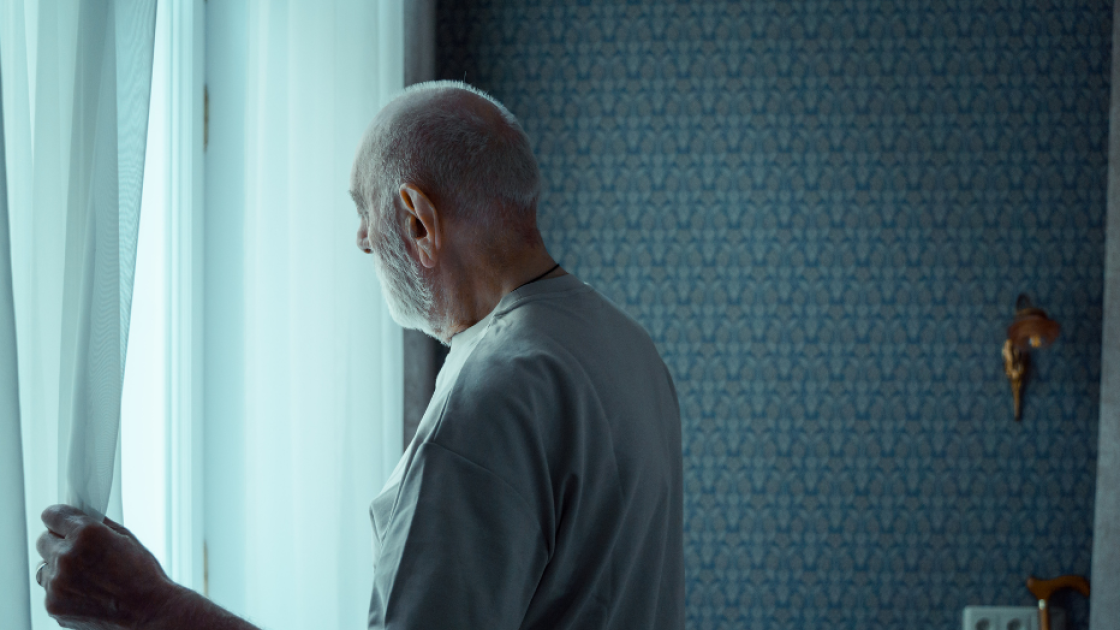
Understanding sundowning and creating a better nighttime routine
If you’re a caregiver for someone with dementia, you may notice a pattern that’s as frustrating as it is heartbreaking: as the sun sets, your loved one becomes more confused, anxious or agitated. This phenomenon is known as sundowning, and it’s one of the more challenging aspects of memory-related illnesses.
What is sundowning?
Sundowning (or sundown syndrome) refers to a set of behaviors and symptoms such as confusion, restlessness, irritability or agitation that typically worsen during the late afternoon or evening hours. It’s most commonly associated with Alzheimer’s disease and other forms of dementia, but people without dementia can also experience similar symptoms, especially if they’re under significant stress, ill or sleep-deprived.
While sundowning symptoms can vary from person to person, common signs include:
- Increased confusion or disorientation
- Mood swings or emotional outbursts
- Restlessness, pacing or wandering
- Difficulty sleeping or increased wakefulness at night
- Hallucinations or delusions
- Anxiety or paranoia
- Resistance to directions or help
These symptoms can be mild or severe and can fluctuate from day to day. It’s important to remember, validate their feelings. Don’t argue with their reality. When agitation arises, their source of frustration may have little to do with what they are saying. Rather, they may have pain that can’t verbalize, are hungry or thirsty, or confused by unfamiliar objects.
Causes of sundowning
It’s important to understand the dementia affects each person in their own way. And, while Alzheimer’s the most common type of dementia, there are more than 100 types of dementia. Sundowning has no single cause, but several factors may contribute.
- Circadian rhythm disruption. Dementia can affect the body’s internal clock, leading to confusion between day and night.
- Fatigue. Mental and physical exhaustion can make it harder for the brain to cope with stressors.
- Low lighting. As natural light fades, shadows and poor lighting can increase confusion or fear.
- Hunger or thirst. Unmet basic needs can heighten agitation.
- Medication side effects. Some medications may affect energy levels, mood or alertness.
- Overstimulation. A busy or noisy environment can overwhelm someone with dementia, especially later in the day.
Estimates vary, but up to 20–45% of people with Alzheimer’s disease are believed to experience sundowning. It typically appears in the middle to later stages of the disease and can worsen over time.
Finding ways to manage sundowning
There’s no one-size-fits-all approach, but caregivers can often reduce symptoms with consistent routines and a calming environment. The key is adaptability and anticipating needs. It’s not easy, especially when your loved one may not be able to verbalize what their needs are.
The time of year can also play a major factor. In the middle of summer, nighttime hours are greatly reduced and can make it difficult for persons with dementia to get enough sleep. Activities are available later in the day and extreme heat can influence symptoms as well. Conversely, shortened daylight hours in the winter can disrupt schedules.
Here are some common strategies to help calm loved ones and ensure a better sleep routine:
Establish a daily routine. Structure provides comfort. Try to keep wake times, meals, activities and bedtime consistent every day. Limit daytime naps to help make going to bed easier.
Reduce evening stimulation. Turn off loud TVs or radios, limit visitors in the late afternoon and dim the lights gradually.
Let in natural light. Exposure to sunlight during the day can help regulate sleep-wake cycles. If natural light is limited, a light therapy box may help.
Monitor diet and hydration. Avoid caffeine or large meals late in the day. Make sure they are drinking enough water.
Use soothing activities. Try calming music, art and coloring, reading, hand massages or familiar photo albums to create a peaceful environment. Find activities they enjoy, but aren’t overly stimulating.
When to Seek Help
If sundowning symptoms are severe, disrupt sleep consistently or become unsafe, consult with your loved one’s health care team. Other medical issues may be contributing to the behavior, such as infection (including UTIs), pain or medication side effects.
Sundowning can be exhausting and emotionally draining for caregivers. If you’re facing this challenge, know that you are not alone and help is available. Support groups, respite care and professional guidance can all be part of your caregiving toolkit. At SIU Medicine, we understand the toll sundowning can take on families. Our team at the Smith Alzheimer’s Center offers comprehensive memory care and caregiver support services to help you navigate every step of the journey.



